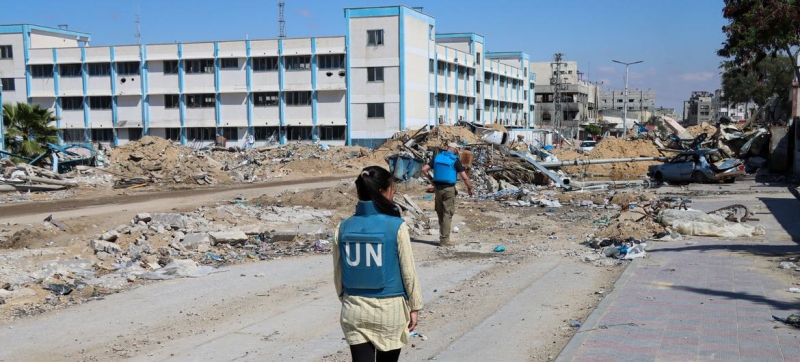
A UN team inspects a destroyed school in Khan Yunis. UN: no improvement in access to humanitarian aid in northern Gaza Peace and Security
Despite hopes stemming from recent Israeli commitments to increase aid, the situation for Gazans remains dire. UN Coordinator for the Occupied Palestinian Territory (OPT) Jamie McGoldrick said this on Friday.
McGoldrick, who oversees crisis relief in Gaza, denied Israeli claims that more than 1,000 trucks entered the strip in the past few days, but only about 800 of them were met on the Palestinian side.
He also noted that the system under which humanitarian organizations shared their coordinates with parties to the conflict to prevent attacks was failing. The UN’s chief envoy to the OPT raised these and other issues with the Israeli military at their first meeting earlier this week.
He again called on Israeli authorities to recognize that their responsibility as the occupying power will only be fulfilled when “aid reaches the civilian population in Gaza.”
Security vacuum
McGoldrick stressed that long delays at checkpoints and a “security vacuum” inside the enclave continue to prevent aid from getting to where it is needed most. He noted that the UN Children’s Fund (UNICEF) employees whose car came under fire on Thursday were held at the checkpoint for several hours.
Read also:
Gaza: UN team records widespread destruction in Khan Yunis
He said about 60 hours had been wasted this month, and delays sometimes meant it was “too late” » continue travel.
Today, only three roads are open for humanitarian transport in Gaza: the central route through the Salah al-Din road, the Al-Rashid coastal road and the military road to eastern side of Gaza. “Not once in the last month or more have three or even two of these roads been open at the same time,” McGoldrick said, adding that all highways are in very poor condition.
Life-threatening hunger
The consequences of limited access to care in the north of the enclave can be seen in the fact that babies are born underweight, he emphasized. Recalling his visit to Kamal Adwan Hospital two weeks ago, the UN official noted that all children there face life-threatening levels of hunger.
“I saw the baby in the incubator – it was a two-day old boy who was not premature, but he weighed 1.2 kg. This will have long-term consequences for the development of this child,” he said.
Stressing the need for a direct line of communication with the Israeli military, McGoldrick noted that the attack on the NGO World Central convoy Kitchen two weeks ago provided evidence of the dangers facing aid workers in Gaza.
“We must have portable radios, VHF radios, that is, everything that is usually used in any crisis situation. We don’t have that,” he said, noting that Israeli authorities have not allowed the use of such devices due to fears that Hamas militants would use them.
Medical Situation
Due to the dire situation in Gaza, the World Health Organization (WHO) called for the creation of an orderly medical evacuation system instead of the existing “ad hoc” scheme.
The destruction of the enclave’s largest hospital, Al-Shifa, during a two-week raid deprived the population of the opportunity to receive specialized surgical care, said trauma surgeon and WHO official Thanos Gargavanis.
Speaking from Gaza, Gargavanis said everything in the hospital was destroyed, including an oxygen station, laboratory instruments and other critical equipment, including a CT scanner and other equipment needed to provide life-saving care.
He described how a tour of the hospital last week revealed open spaces with makeshift graves and mountains of bodies.
WHO and other UN agencies are helping to give the bodies found in Al-Shifa a dignified burial once they have been identified. “This destruction makes it feel like we’ve gone back 60 years to a time when medical imaging and laboratory tests were unavailable,” Gargavanis said. “We want to reiterate that hospitals should never become military targets.”
